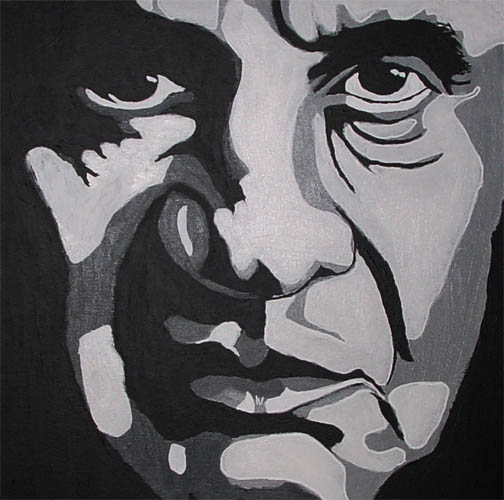Rising above his infirmities, or simply refusing to succumb to them, Johnny Cash delivers a mesmerizing final testimony on Ain’t No Grave (painting of Johnny Cash in his 70s from the Black and White series by Mattie van Tol, acryl on canvas, shown at Art4People’s blogAmen
By Billy Altman
American VI: Ain't No Grave
Johnny Cash
American/Lost HighwayIt's hard not to get chills listening to Ain't No Grave, the sixth and final edition of the series of collaborations between Johnny Cash and producer Rick Rubin recorded over a 10-year period between 1993 and the country icon's death in the fall of 2003. Culled from the same sessions that yielded the '06-released American V: A Hundred Highways—sessions that took place just months after the passing of wife June, and under the full weight of Cash's sense of his own impending death—Ain't No Grave perhaps can't help but carry a ghostly, beyond-the-sunset mood about it. But the chills come more from recognizing that the unnerving feeling you're getting from listening to Johnny Cash for the last time completes a circle that began with the unnerving feeling you got the very first time you heard him. Whether you discovered him through "I Walk The Line," or "Don't Take Your Guns to Town," or "I Still Miss Someone," or "Ring of Fire," or "Folsom Prison Blues," or (fill in the blank), you know just how different from everyone else Johnny Cash always sounded—from the beginning of his career, and with these recordngs, right up to the end as well.
Throughout these performances, Cash repeatedly rises above the highly perceptible physical limitations on his voice and his stamina; through sheer force of will, he simply refuses to succumb to them. "O death, where is thy sting? O grief, where is thy vic-tor-ree?" he asks on "I Corinthians 15:55," his one original here. "Hope springs eternal just over the rise/When I see my Redeemer beckon to me." Indeed, that indefatigable Man in Black spirit anchors most of the tracks here, which range from country warhorses like the Sons of the Pioneers' "Cool Water" and Kris Kristoffersen's "For The Good Times" to folk classics such as Tom Paxton's "Can't Help But Wonder Where I'm Bound" and Ed McCurdey's cold war era peace anthem, "Last Night I Had the Strangest Dream," which Cash infuses with a truly inspirational sense of prophet-like vision. And when he tacks on an extra verse to "Satisfied Mind" to note the internal calm of his own personal end-of-days journey, it is, again, simply arresting.
There have been some who've questioned the wisdom of framing this musical giant's final moments so nakedly for all to hear—that presenting a frail and diminished Johnny Cash does something of a disservice to his legacy as the indomitable lion of country music. What's missing from that viewpoint (besides an understanding that the very history-conscious Cash certainly knew that country's very first superstar, Jimmie Rodgers, recorded his last few songs, literally, on his deathbed in 1933) is an appreciation of Johnny Cash's lifelong role as country music's, and American music's—and ultimately America's—social conscience, and of his ongoing singular struggles to reconcile the angels and demons forever fighting for control of his world, and ours. Ain't No Grave is a powerful summation of that soul-defining battle, and the guiding light it emanates shines on brightly for all to witness, and to learn from. Amen, brother John. Amen.
Founder/Publisher/Editor: David McGee
Contributing Editors: Billy Altman, Laura Fissinger, Christopher Hill, Derk Richardson
Logo Design: John Mendelsohn (www.johnmendelsohn.com)
Website Design: Kieran McGee (www.kieranmcgee.com)
Staff Photographers: Audrey Harrod (Louisville, KY; www.flickr.com/audreyharrod), Alicia Zappier (New York)
E-mail: thebluegrassspecial@gmail.com
Mailing Address: David McGee, 201 W. 85 St.—5B, New York, NY 10024



